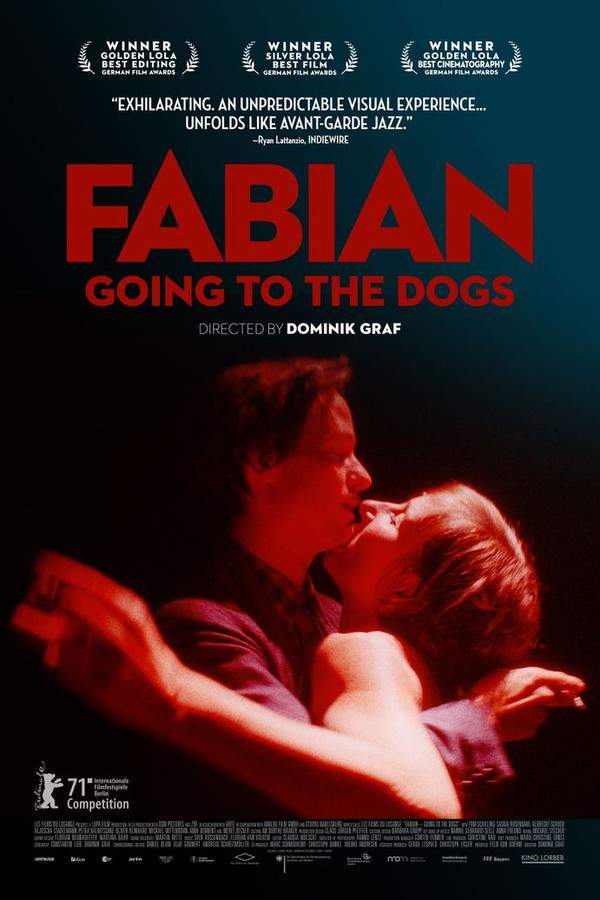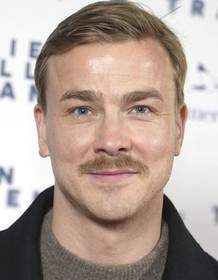Fabian: Going to the Dogs 2022

In 1930s Berlin, Jakob Fabian lives a life of pleasure and cynicism until he meets Cornelia, a woman who inspires hope within his skeptical nature. As their relationship deepens, Fabian is forced to confront his own troubled past and the growing turmoil of a Germany struggling with widespread unemployment and social unrest. He must navigate a world on the brink of collapse and re-evaluate his place within it.
Does Fabian: Going to the Dogs have end credit scenes?
No!
Fabian: Going to the Dogs does not have end credit scenes. You can leave when the credits roll.
Meet the Full Cast and Actors of Fabian: Going to the Dogs
Explore the complete cast of Fabian: Going to the Dogs, including both lead and supporting actors. Learn who plays each character, discover their past roles and achievements, and find out what makes this ensemble cast stand out in the world of film and television.

Albrecht Schuch
Stephan Labude, Fabian's friend

Michael Wittenborn
Justizrat Labude

Saskia Rosendahl
Cornelia Battenberg

Tom Schilling
Jakob Fabian

Meret Becker
Irene Moll

Aljoscha Stadelmann
Produzent Makart

Anne Bennent
Baroness Ruth Reiter

Elmar Gutmann
Herr Fabian

Eva Medusa Gühne
Frau Hohlfeld

Petra Kalkutschke
Frau Fabian
External Links and Streaming Options
Discover where to watch Fabian: Going to the Dogs online, including streaming platforms, rental options, and official sources. Compare reviews, ratings, and in-depth movie information across sites like IMDb, TMDb, Wikipedia or Rotten Tomatoes.
Ratings and Reviews for Fabian: Going to the Dogs
See how Fabian: Going to the Dogs is rated across major platforms like IMDb, Metacritic, and TMDb. Compare audience scores and critic reviews to understand where Fabian: Going to the Dogs stands among top-rated movies in its genre.

The Movie Echo Score
Fabian: Going to the Dogs presents a mixed but generally favorable experience, driven by inventive visual choices and solid performances. Critics commend the film’s experimental direction and occasional lyrical moments, while noting uneven pacing and occasional immersion lapses. User feedback echoes the same polarity, praising the atmospheric texture yet condemning the adaptation choices. The aggregate impression is that the work succeeds more often than it falters, resulting in a respectable overall rating.
The Movie Echo Score Breakdown for Fabian: Going to the Dogs

Art & Craft
In terms of direction and cinematography, reviewers highlight the film’s bold visual experimentation and restless editing. Claudia Wolscht’s editing and Hanno Lentz’s camerawork receive particular praise for adding kinetic energy. Some critics note occasional awkward sequencing and a lack of originality, but the overall craftsmanship is regarded as strong and inventive.

Character & Emotion
When it comes to character depth, the leads are frequently described as genuine and emotionally resonant. Performances by Schilling and Rosendahl are singled out for their warmth, and the ensemble is said to convey nuanced feelings. One dissenting view finds Schilling’s portrayal weak, yet the prevailing sentiment affirms a solid emotional core.

Story & Flow
Regarding narrative cohesion, critics point to a leisurely pacing that sometimes undermines urgency, and a tendency toward melodramatic excess. While some praise the film’s daring structure and occasional exhilarating twists, others find the plot uneven and the adaptation less succinct than its source. The story thus lands in a mixed zone between engaging and uneven.

Sensory Experience
The sensory experience garners consistent approval, with reviewers noting a kaleidoscopic visual style and striking sound design. The film’s experimental texture, poetic ambience, and effective soundtrack contribute to a vivid atmospheric presence. Even where visual boldness is critiqued, the overall sensory impact remains a prominent strength.

Rewatch Factor
Rewatch value is viewed as moderate to high; the film’s stylistic flair and layered characters invite repeated viewings. Users appreciate its non‑cliché presentation and reflective tone, while a few criticize its length and perceived ideological bias. The balance of inventive elements and occasional fatigue yields a respectable replay appeal.

68
Metascore
tbd
User Score


92%
TOMATOMETER

73%
User Score

65
%
User Score

3.9
From 190 fan ratings
Take the Ultimate Fabian: Going to the Dogs Movie Quiz
Challenge your knowledge of Fabian: Going to the Dogs with this fun and interactive movie quiz. Test yourself on key plot points, iconic characters, hidden details, and memorable moments to see how well you really know the film.
Fabian: Going to the Dogs Quiz: Test your knowledge on the film 'Fabian: Going to the Dogs', exploring themes of love, loss, and existential despair in 1930s Berlin.
What profession does Jakob Fabian have at the beginning of the film?
Copywriter for a cigarette company
Novelist
Academic
Film producer
Show hint
Full Plot Summary and Ending Explained for Fabian: Going to the Dogs
Read the complete plot summary of Fabian: Going to the Dogs, including all major events, twists, and the full ending explained in detail. Explore key characters, themes, hidden meanings, and everything you need to understand the story from beginning to end.
In the lively nightlife of 1931 Berlin, Jakob Fabian (Tom Schilling), a disenchanted copywriter for a cigarette company, longs to escape the monotony of his role and fulfill his dreams of becoming a writer. Among his companions is his hedonistic best friend, Stephan Labude (Albrecht Schuch), who aspires to achieve academic tenure. Their friendship thrives amidst excursions to nightclubs and brothels, yet both men grapple with the shadows of their pasts—Fabian haunted by his experiences during World War I, which fill him with a heavy sense of despair regarding love and life, rendering them almost meaningless.
One night, fate intervenes when Jakob encounters Cornelia (Saskia Rosendahl), a youthful aspiring actress, in an underground club. Their lives entwine, but Cornelia holds back, unsure of their relationship’s potential for endurance. As they bond, the trio of Fabian, Cornelia, and Labude share carefree afternoons, including a lakeside swim that unveils Jakob’s insecurities—his inability to swim a poignant reminder of his vulnerabilities.
As economic turbulence grips Germany, unemployment soars, and Fabian faces the harsh reality of being laid off from his job. In stark contrast, Cornelia’s career begins to flourish, entrenching her in the charms of Makart (Aljoscha Stadelmann), an older, established producer who tempts her to compromise her artistic passions. Despite Jakob’s protests against her decisions, Cornelia assures him of their shared future. However, she mysteriously disappears the following morning, shattering Fabian’s heart.
In the meantime, Labude submits his thesis to Berlin University with hopes for acceptance, battling tensions with Weckherlin (the chancellor’s assistant). The rising influence of the Nazi Party complicates their lives, culminating in Labude’s arrest due to his communist views and activism. After a concerning period, his father manages to secure his release through bail.
In a touching twist of fate, Jakob finds himself at a film studio where Cornelia auditions for a significant role. Her heart-wrenching performance—a plea to reconnect with Jakob—captivates Makart and other producers, securing her a leading position and reminding her of their enduring love.
When Jakob and Cornelia finally meet at the café, his icy demeanor and accusations of unfaithfulness lead to a heartbreaking confrontation. Despite initial resistance, they eventually reconcile, reaffirming their commitment against the backdrop of a tumultuous era. However, as Labude goes missing, a frantic search ensues, ultimately leading to a tragic reunion at a nude art studio, where Labude’s self-destructive habits have taken a severe toll. The situation turns dire when Fabian learns of Labude’s demise, a self-inflicted gunshot wound, more agony heaped upon grievous loss as he reads Labude’s suicide note—a heartbreaking lament of lost aspirations, with Labude urging him to “live a better life.”
In the wake of this tragedy, Fabian’s anger erupts during a confrontation with the university chancellor, who had actually approved Labude’s thesis, revealing the unfortunate timing of their issues. Overcome with grief, Jakob is compelled to leave Berlin, returning to Dresden, where he struggles to cope with the loss of his friend.
As the weeks pass, memories of Labude and Cornelia haunt him, and he soon discovers a magazine showcasing Cornelia’s ascent to stardom. Reaching out, they share a conversation that oscillates between somber reflections and light-hearted hopes for the future, leading to plans for a reunion in Berlin.
While preparing for their meeting, memories flood back as he strolls through Dresden, only to be interrupted by scenes of carefree youth mirrored in three boys playing by the lake. As he nears the train station, he sees a boy on the verge of jumping from a bridge. With no thought for his safety, Jakob rushes to the boy, but as he tries to intervene, he is swept away by the current, fighting futilely against nature’s overpowering force.
Meanwhile, Cornelia waits at their arranged spot in Berlin, blissfully unaware of the ultimate sacrifice Jakob has made while striving to save another, leaving behind a poignant story steeped in tragedy.
Uncover the Details: Timeline, Characters, Themes, and Beyond!

Coming soon on iOS and Android
The Plot Explained Mobile App
From blockbusters to hidden gems — dive into movie stories anytime, anywhere. Save your favorites, discover plots faster, and never miss a twist again.
Sign up to be the first to know when we launch. Your email stays private — always.
Watch Trailers, Clips & Behind-the-Scenes for Fabian: Going to the Dogs
Watch official trailers, exclusive clips, cast interviews, and behind-the-scenes footage from Fabian: Going to the Dogs. Dive deeper into the making of the film, its standout moments, and key production insights.
Fabian: Going to the Dogs Other Names and Titles
Explore the various alternative titles, translations, and other names used for Fabian: Going to the Dogs across different regions and languages. Understand how the film is marketed and recognized worldwide.
Quick Links: Summary, Cast, Ratings, More

What's After the Movie?
Not sure whether to stay after the credits? Find out!
Explore Our Movie Platform
New Movie Releases (2026)
Famous Movie Actors
Top Film Production Studios
Movie Plot Summaries & Endings
Major Movie Awards & Winners
Best Concert Films & Music Documentaries
Movie Collections and Curated Lists
© 2026 What's After the Movie. All rights reserved.















